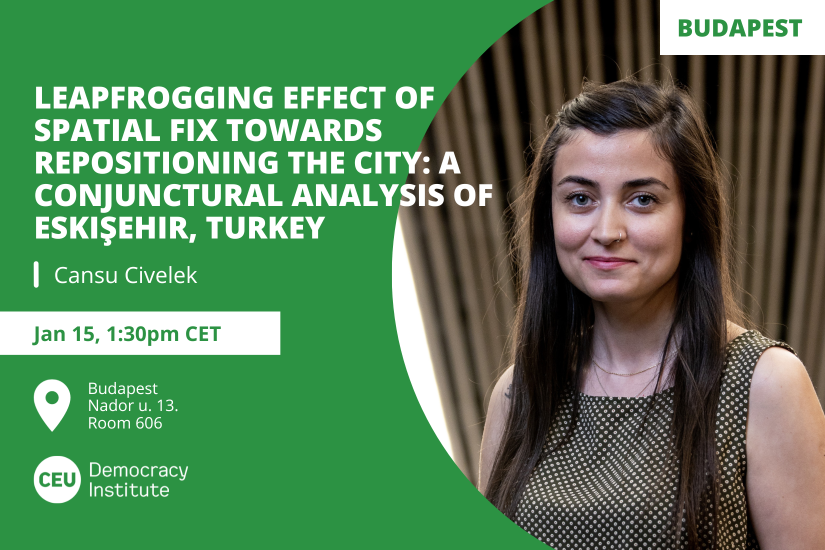
The Inequalities and Democracy Workgroup of the CEU Democracy Institute cordially invites you to its public seminar.
If you would like to attend, please register here.
Please keep in mind that external guests will not be able to enter the building without prior registration.
The seminar starts with a 25-minute paper presentation followed by comments from the discussant. Discussion open to the audience follows. To actively take part in the discussion, please read the draft paper beforehand. The paper is available upon request from the author.
Abstract:
The prevalence of neoliberalism has produced varied effects on cities ranging from rapid growth to gradual disempowerment. This paper examines the neoliberal urban governance in Turkey, placing particular emphasis on Eskişehir’s repositioning strategies in response to disempowerment. The conjunctural analysis employed in this paper to examine the Eskisehir case suggests that local governments may lean towards overcoming financial and political constraints by restructuring the urban space through symbolic revitalizations. Accordingly, Eskişehir’s municipality, ruled by the center-left opposition party, sought to redefine the city as a stronghold of secularism with the claims of Europeanization and modernization. They introduced the "Eskişehir model" as a contrasting narrative to the ruling AKP's urban vision rooted in Islamist-nationalist nativism. The mechanisms of this "spatial fix" in Eskişehir reveal that ideological-political clashes at the national level can serve as windows of opportunity for local governments to counter decline and disempowerment. These mechanisms had leapfrogging effects not only fostering capital accumulation but also contributing to the consolidation of political power. However, beneath the celebrated model lie disparities in the city's restructuring, particularly affecting lower-income groups and refugees.
Speaker:
Cansu Civelek graduated from the Department of Political Science and Public Administration at the Middle East Technical University, Ankara. She obtained her master’s degree at the Social and Cultural Anthropology Department at the University of Vienna. In 2015, she completed her first self-funded documentary movie called “Warning Karapınar! Voices from an Urban Regeneration” developed from her master’s thesis. In 2020, she received her doctoral degree from the Social and Cultural Anthropology Department in Vienna with a dissertation titled “Non-spectacular policy-making: Urban governance, silence, and dissent in an abortive renewal project in Eskişehir, Turkey”. Currently at the DI, she works on her book project that inquires urban policy-making and urban governance practices of Eskişehir’s municipal government while tackling the questions of collective silence and (de)politicization. Moreover, she develops a post-doctoral research project on Afghan refugees (in)access to health care system in Turkey.
Discussant:
Andrew Cartwright has a background in law. He attended the University of Warwick in the UK. Andrew’s doctoral research investigated attempts to undo collectivization in Romania, using historical and ethnographic analysis to describe the land restitution process. Since then, his research has focused on the various transitions of the rural areas in post-socialist countries, including the formation of land markets, the sustainability of public services and the implications of demographic change for inequality, for example, shrinking settlements and farmland abandonment. The research examines the consequences of political marginalization and urban bias as well as the peculiar ways in which rural areas experience globalization, such as the rise of circular migration and the ongoing dilemma of inherited property.